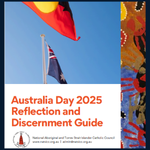Latest News & Media Releases
-
Reflection from the President
Read more...

"With the tongue we praise our Lord and Father, and with it we curse human beings, who have been made in God’s likeness. Out of the same mouth come praise and cursing.
My brothers and sisters, this should not be." James 3:9-10
I am intrigued by the way that James writes about the difficulties of the ‘taming of the tongue’.
-
Gaza ceasefire
Read more...

Peace with Justice
O Lord, you will hear the desire of the meek; you will strengthen their heart; you will incline your ear to do justice for the orphan and the oppressed, so that those from earth may strike terror no more. Psalm 10:17– 18
It is with prayerful gratitude that we received the news that a ceasefire agreement between Israel and Hamas had been reached, and that arrangements had begun for the exchange of hostages.
-
First Nations
Read more...
 Listening deeply
Listening deeply Just released: Australia Day 2025 Reflection and Discernment Guide from the National Aboriginal and Torres Strait Islander Catholic Council (NATSICC)
NATSICC urges the nation to engage in deep reflection and prayer as Australia Day 2025 approaches.
-
NCCA Public Statement
Read more...

GAZA - Need for lasting ceasefire and end to ongoing suffering
O Lord, you will hear the desire of the meek; you will strengthen their heart; you will incline your ear to do justice for the orphan and the oppressed, so that those from earth may strike terror no more. Psalm 10:17– 18
“We welcome the peace initiatives … and offer prayerful support for all the parties trying to broker a lasting peace for Gaza” Rev John Gilmore, NCCA President.
Newsletter Signup
Events

The NCCA is 18 Christian Churches, gathered from across this wide brown land, who have embarked on a pilgrimage together. We each bring a widely varied history of place, experience, and theology, but we share a common faith and confession in the Lord Jesus Christ as God and Saviour. We also share a common future as we are convinced that the future of Christians in Australia lies together, not in separation.
 At the Uppsala Assembly of the World Council of Churches a sentence was used that I find inspirational. It is this; ‘the Church is a sign of the coming unity of the whole human family’. This vision is a call to a hope beyond matters that distinguish us as individual church communities. It also directs our attention to an ultimate vision of unity – where people of every nation, tribe and language gather together in worship of God.
At the Uppsala Assembly of the World Council of Churches a sentence was used that I find inspirational. It is this; ‘the Church is a sign of the coming unity of the whole human family’. This vision is a call to a hope beyond matters that distinguish us as individual church communities. It also directs our attention to an ultimate vision of unity – where people of every nation, tribe and language gather together in worship of God.
Yes, there are differences between Christian communities and churches. Some of the differences reflect our theological understanding, cultural identity, and journeys in mission. These differences do not need to become foundations of separation.
Engaging in the life of the National Council of Churches in Australia is one way of intentionally deciding to deepen our relationships with each other so that we give expression to a sense of unity that takes us beyond our selves and the differences we have.
In the NCCA, 18 Christian Churches share an understanding and a commitment to action together, we see evidence of our work in several ways:
We are committed to reconciliation with Australia’s First Nations and to the Uluru Statement from the Heart.
There is the continuing work of the NCCA through:
Act for Peace, our international aid agency,
The Australian Churches Refugee Task Force
The Faith and Unity Commission,
The Safe Church Program
and so much more.
What is clear in all of this is that we are ‘better together’. In my own particular tradition, a key scripture is from Ephesians where Paul affirms that there is ‘one Lord, one faith, one baptism, one God and Father of all, who is above all and through all and in all.’ (Eph 4:4-5). This passage is a reminder of our unity before God.
I hope that as you learn about the NCCA, explore this website and follow the links to our member churches, that you will grow in your appreciation of both what unites us and also the gifts that the particular Christian traditions are to the NCCA.
Reverend John Gilmore
President
National Council of Churches in Australia
The National Council of Churches in Australia (NCCA) is an ecumenical council of member Australian Christian Churches.
pdf NCCA Constitution Amended 30 October 2019 (968 KB)
pdf Australian Churches Covenanting Together 2016v. (70 KB)
The NCCA gathers together Churches and Christian communities which confess the Lord Jesus Christ as God and Saviour according to the Scriptures. We commit to deepen our relationship with each other and to work together towards the fulfilment of common witness, proclamation and service, to the glory of the one God, Father, Son and Holy Spirit. Read the NCCA story.
State and National Co-operation
The National Council of Churches in Australia is a national organisation that works in partnership with state ecumenical councils around Australia.
Forum and Board
While the National Forum of the Council meets every three years, ongoing oversight of the Council is provided by the Board, which is made up of nominated Directors from national churches.
The National Council of Churches is supported by the General Secretariat, headed by the General Secretary.
Departments
The NCCA works through a number of Commissions, Networks, Taskforces and Programs. These constitute the 'departments' of the NCCA and order its workplan.
Act for Peace (previously known as Christian World Service)
Act for Peace is the international aid agency of the NCCA. Its focus is on assisting the most conflict and disaster-affected communities to be safe. Act for Peace supports ecumenical partners to do this in, and with communities displaced from, countries such as Syria, Iraq, Palestine, South Sudan, Ethiopia, Zimbabwe, Myanmar and Sri Lanka. Act for Peace manage the:
- annual Christmas Bowl, which has been generously supported by Australian churches since 1948.
- annual Ration Challenge, which raises money for emergency food, healthcare and life-saving support for refugees by eating the same rations for one week.
- Ecumenical Accompaniment Programme in Palestine and Israel (EAPPI) is a program of the World Council of Churches (WCC). The EAPPI seeks to support local and international efforts to end the Israeli occupation and bring a resolution to the Israeli-Palestinian conflict with a just peace, based on international law and relevant United Nations resolutions.
Faith and Unity
The NCCA's Faith and Unity Commission brings together theologians from the member churches who act in a voluntary capacity. The Commission engages with the theological work of the wider Church, both to learn and to contribute.
Safe Church Program
For over a decade, the Safe Church Program has helped churches and Christian ministries to create safer environments for children and vulnerable adults. It has its own membership base that includes both NCCA member and non-member churches, and it works across all denominations to support churches in their safeguarding journey.
Australian Churches Refugee Taskforce
A Christian vision of compassion and hospitality for asylum seekers and refugees.
First Nations
NCCA is committed to the churches working together for justice for Aboriginal and Torres Strait Islander Australians, and for the healing of our peoples. We believe that Aboriginal and Torres Strait Islander Peoples, nurtured and sustained by God before colonisation, are celebrated at the very heart of what is means to be Australian.
Aboriginal and Torres Strait Islander Development Fund
The Aboriginal & Torres Strait Islander Development Fund (ATSIDF), of the National Council of Churches in Australia, is a tax deductible fund set up to assist Aboriginal & Torres Strait Islander Peoples by giving small, usually one-off grants for community development projects. The projects are funded through the Martung Upah Appeal.
Justice, Peace and Care for Creation
The NCCA brings together Church networks with a shared common interest in justice issues related to Family Violence, Modern Slavery and Care for Creation.
Interfaith Dialogue
The NCCA is a founding partner in the Australian National Dialogue of Christians, Muslims and Jews (ANDCMJ). The Dialogue was officially 'launched' in March 2003 after 12 months of formal preparation, which was preceded by informal contact and discussions between the NCCA, AFIC (Australian Federation of Islamic Councils) and ECAJ (Executive Council of Australian Jewry).
The NCCA is a member of the Australian Partnership of Religious Organisations (APRO) from its beginnings in 2003.
Funds
The NCCA oversees two funds that are available for ecumenical work:
Churches Working Together
 “The National Council of Churches in Australia gathers together in pilgrimage those Churches and Christian communities which confess the Lord Jesus Christ as God and Saviour according to the Scriptures and commit themselves to deepen their relationship with each other in order to express more visibly the unity willed by Christ for his Church, and to work together towards the fulfilment of their mission of common witness, proclamation and service, to the glory of the one God, Father, Son and Holy Spirit.”
“The National Council of Churches in Australia gathers together in pilgrimage those Churches and Christian communities which confess the Lord Jesus Christ as God and Saviour according to the Scriptures and commit themselves to deepen their relationship with each other in order to express more visibly the unity willed by Christ for his Church, and to work together towards the fulfilment of their mission of common witness, proclamation and service, to the glory of the one God, Father, Son and Holy Spirit.”
The National Council of Churches in Australia is an ecumenical council of member Australian Christian Churches.
The Ecumenical Movement in Australia
What is Ecumenism?
pdf Statement on Ecumenism (108 KB) (8 April 2021)
A brief history of the NCCA
The modern ecumenical movement began to take shape as the 19th century drew to a close. Initiatives among students and between Church mission agencies led the way. This country saw the formation of the Australian Student Christian Movement (1896) and the National Missionary Council (1926).
Out of the devastation of World War II sprang the Australian Committee for the World Council of Churches (1946). This developed into the Australian Council of Churches which, in 1994, gave way to the National Council of Churches in Australia.
The movement for Christian unity in this country was, initially, an Anglican and Protestant affair. Eastern and Oriental Orthodox Churches came in, in strength, during the 1960s and 70s. For Catholics, the 2nd Vatican Council opened up fresh possibilities for relationships with other Churches, and the transition to the National Council of Churches in Australia (1994) saw the Catholic Church become a full participant in Australia's national ecumenical body.
The NCCA is its eighteen member Churches in their commitment each to the others and all to the world for which Christ died. It works in collaboration with state ecumenical councils around Australia. It is an associate council of the World Council of Churches, a member of the Christian Conference of Asia and a partner of Pacific Conference of Churches and other national ecumenical bodies throughout the world.
 |
 |
 |
||||
WORLD COUNCIL OF CHURCHES |
AUSTRALIAN PARTNER COUNCILS |
CHRISTIAN CONFERENCE OF ASIA |
PACIFIC CONFERENCE OF CHURCHES |
The National Council of Churches in Australia administers the following ecumenical funds:
The NCCA Newsletter is produced fortnightly highlighting the areas that the NCCA and the member churches are currently focussing activites together.










